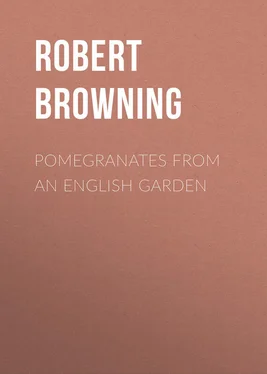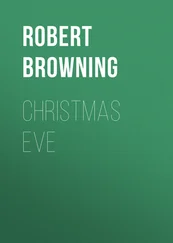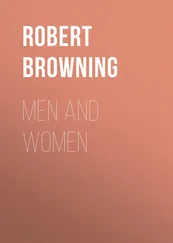Robert Browning - Pomegranates from an English Garden
Здесь есть возможность читать онлайн «Robert Browning - Pomegranates from an English Garden» — ознакомительный отрывок электронной книги совершенно бесплатно, а после прочтения отрывка купить полную версию. В некоторых случаях можно слушать аудио, скачать через торрент в формате fb2 и присутствует краткое содержание. Жанр: foreign_antique, foreign_prose, на английском языке. Описание произведения, (предисловие) а так же отзывы посетителей доступны на портале библиотеки ЛибКат.
- Название:Pomegranates from an English Garden
- Автор:
- Жанр:
- Год:неизвестен
- ISBN:нет данных
- Рейтинг книги:5 / 5. Голосов: 1
-
Избранное:Добавить в избранное
- Отзывы:
-
Ваша оценка:
- 100
- 1
- 2
- 3
- 4
- 5
Pomegranates from an English Garden: краткое содержание, описание и аннотация
Предлагаем к чтению аннотацию, описание, краткое содержание или предисловие (зависит от того, что написал сам автор книги «Pomegranates from an English Garden»). Если вы не нашли необходимую информацию о книге — напишите в комментариях, мы постараемся отыскать её.
Pomegranates from an English Garden — читать онлайн ознакомительный отрывок
Ниже представлен текст книги, разбитый по страницам. Система сохранения места последней прочитанной страницы, позволяет с удобством читать онлайн бесплатно книгу «Pomegranates from an English Garden», без необходимости каждый раз заново искать на чём Вы остановились. Поставьте закладку, и сможете в любой момент перейти на страницу, на которой закончили чтение.
Интервал:
Закладка:
THE PATRIOT
It was roses, roses, all the way,
With myrtle mixed in my path like mad:
The house-roofs seemed to heave and sway,
The church-spires flamed, such flags they had,
A year ago on this very day.
The air broke into a mist with bells,
The old walls rocked with the crowd and cries.
Had I said, “Good folk, mere noise repels —
“But give me your sun from yonder skies!”
They had answered “And afterward, what else?”
Alack, it was I who leaped at the sun
To give it my loving friends to keep!
Nought man could do, have I left undone:
And you see my harvest, what I reap
This very day, now a year is run.
There’s nobody on the house-tops now —
Just a palsied few at the windows set;
For the best of the sight is, all allow,
At the Shambles’ Gate – or, better yet,
By the very scaffold’s foot, I trow.
I go in the rain, and, more than needs,
A rope cuts both my wrists behind,
And I think, by the feel, my forehead bleeds,
For they fling, whoever has a mind,
Stones at me for my year’s misdeeds.
Thus I entered, and thus I go!
In triumphs, people have dropped down dead.
“Paid by the world, what dost thou owe
Me?” – God might question; now instead,
’Tis God shall repay: I am safer so.
The Patriot, on his way to the scaffold, surrounded by a hooting crowd, remembers how, just a year ago, the same people had been mad in their enthusiasm for him. Anything at all, however extravagant, would have been too little for them to do for him (stanza 2; cf. Gal. iv. 15, 16); but now – ! The fourth stanza is very powerful. All have gone who can, to be ready to see the execution; only the “palsied few,” who cannot, are at the windows to see him pass. In the last stanza the thought of a more sudden contrast still is presented. A man may drop dead in the midst of a triumph, to find that in its brief plaudits he has his reward, while a vast account stands against him at the higher tribunal. Far better die amid the execrations of men and find the contrast reversed.
It is “an old story,” and therefore general; but one naturally thinks of such cases as Arnold of Brescia, or the tribune Rienzi. A higher Name than these need not be introduced here, in proof of the people’s fickleness!
INSTANS TYRANNUS
Of the million or two, more or less,
I rule and possess,
One man, for some cause undefined,
Was least to my mind.
I struck him, he grovelled of course —
For, what was his force?
I pinned him to earth with my weight
And persistence of hate;
And he lay, would not moan, would not curse,
As his lot might be worse.
“Were the object less mean, would he stand
“At the swing of my hand!
“For obscurity helps him, and blots
“The hole where he squats.”
So, I set my five wits on the stretch
To inveigle the wretch.
All in vain! Gold and jewels I threw
Still he couched there perdue;
I tempted his blood and his flesh,
Hid in roses my mesh,
Choicest cates and the flagon’s best spilth
Still he kept to his filth.
Had he kith now or kin, were access
To his heart, did I press
Just a son or a mother to seize!
No such booty as these.
Were it simply a friend to pursue
’Mid my million or two,
Who could pay me, in person or pelf,
What he owes me himself!
No: I could not but smile through my chafe:
For the fellow lay safe
As his mates do, the midge and the nit,
– Through minuteness, to wit.
Then a humour more great took its place
At the thought of his face:
The droop, the low cares of the mouth,
The trouble uncouth
’Twixt the brows, all that air one is fain
To put out of its pain.
And, “no!” I admonished myself,
“Is one mocked by an elf,
“Is one baffled by toad or by rat?
“The gravamen’s in that!
“How the lion, who crouches to suit
“His back to my foot,
“Would admire that I stand in debate!
“But the small turns the great
“If it vexes you, – that is the thing!
“Toad or rat vex the king?
“Though I waste half my realm to unearth
“Toad or rat, ’tis well worth!”
So, I soberly laid my last plan
To extinguish the man.
Round his creep-hole, with never a break
Ran my fires for his sake;
Over-head, did my thunder combine
With my under-ground mine:
Till I looked from my labour content
To enjoy the event.
When sudden … how think ye, the end?
Did I say “without friend?”
Say rather from marge to blue marge
The whole sky grew his targe
With the sun’s self for visible boss,
While an Arm ran across
Which the earth heaved beneath like a breast
Where the wretch was safe prest!
Do you see! Just my vengeance complete,
The man sprang to his feet,
Stood erect, caught at God’s skirts, and prayed!
– So, I was afraid!
“Instans Tyrannus,” the present tyrant, the tyrant for the time only, whose apparently illimitable power to hurt shrivels into nothing in presence of the King of kings, whose dominion is everlasting.
The poor victim of this tyrant’s oppression is a true child of God, but the nobility of his inner life is of course concealed from the proud wretch who despises him, and who, it must be remembered, is the speaker throughout. We must be careful, therefore, to estimate at their proper worth the epithets he applies and the motives he attributes to the object of his hate. He can, of course, think of no other reason why his victim “would not moan, would not curse,” than that, if he did, “his lot might be worse.” And again, when temptation failed to shake his steadfast patience, the tyrant is quite consistent with himself, as one of those who call evil good, and good evil, in speaking of him as still keeping “to his filth.” The last stanza is magnificent. Has the power of prayer ever been set forth in nobler language?
THE LOST LEADER
Just for a handful of silver he left us,
Just for a riband to stick in his coat —
Found the one gift of which fortune bereft us,
Lost all the others, she lets us devote;
They, with the gold to give, doled him out silver,
So much was theirs who so little allowed:
How all our copper had gone for his service!
Rags – were they purple, his heart had been proud!
We that had loved him so, followed him, honoured him,
Lived in his mild and magnificent eye,
Learned his great language, caught his clear accents,
Made him our pattern to live and to die!
Shakespeare was of us, Milton was for us,
Burns, Shelley, were with us, – they watch from their graves!
He alone breaks from the van and the freemen,
He alone sinks to the rear and the slaves!
We shall march prospering, – not thro’ his presence;
Songs may inspirit us, – not from his lyre;
Deeds will be done, – while he boasts his quiescence,
Still bidding crouch whom the rest bade aspire:
Blot out his name, then, record one lost soul more,
One task more declined, one more footpath untrod,
One more devil’s-triumph and sorrow for angels,
One more wrong to man, one more insult to God!
Life’s night begins: let him never come back to us!
There would be doubt, hesitation and pain,
Forced praise on our part – the glimmer of twilight,
Never glad confident morning again!
Best fight on well, for we taught him – strike gallantly,
Menace our heart ere we master his own;
Then let him receive the new knowledge and wait us,
Pardoned in heaven, the first by the throne!
Интервал:
Закладка:
Похожие книги на «Pomegranates from an English Garden»
Представляем Вашему вниманию похожие книги на «Pomegranates from an English Garden» списком для выбора. Мы отобрали схожую по названию и смыслу литературу в надежде предоставить читателям больше вариантов отыскать новые, интересные, ещё непрочитанные произведения.
Обсуждение, отзывы о книге «Pomegranates from an English Garden» и просто собственные мнения читателей. Оставьте ваши комментарии, напишите, что Вы думаете о произведении, его смысле или главных героях. Укажите что конкретно понравилось, а что нет, и почему Вы так считаете.












